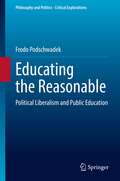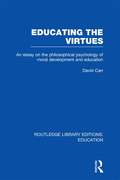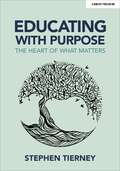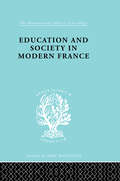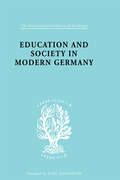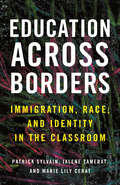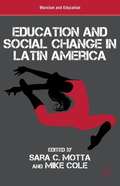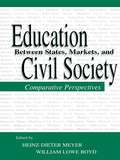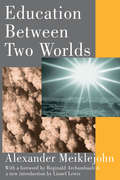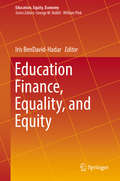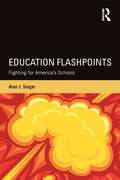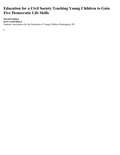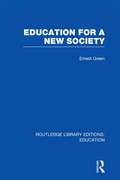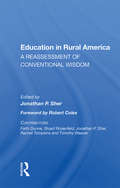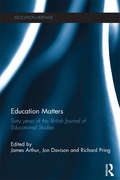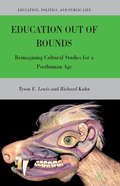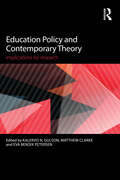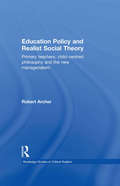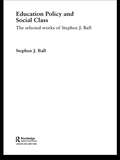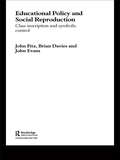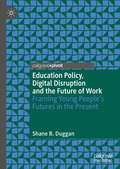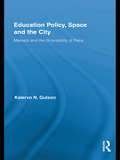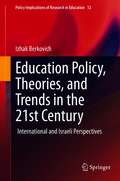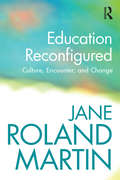- Table View
- List View
Educating the Reasonable: Political Liberalism and Public Education (Philosophy and Politics - Critical Explorations #17)
by Frodo PodschwadekOffering the first developed account of political liberal education, this book combines a thorough analysis of the theoretical groundwork of political liberal education with application-oriented approaches to contemporary educational challenges. Following in depth engagement with the shortcomings of Rawls’ theory and addressing some key objections to neutrality-based restrictions in education, the volume moves on to provide an insightful discussion of topics such as same-sex relations in sex-education, the position of migrant children and the rights of religious parents to determine the education of their children. This book outlines a political liberal account of education which provides a useful contribution to the current debates about liberalism and education in a way unprecedented in the literature on political liberalism so far. It is of interest to anyone working at the intersection of political philosophy and philosophy of education as well as for scholars with a broader interest in how liberalism can respond to the challenges of value pluralism.
Educating the Virtues: An Essay on the Philosophical Psychology of Moral Development and Education (Routledge Library Editions: Education)
by David CarrTracing the views on moral life of such past philosophers as Plato, Aristotle and Kant, as well as of such theorists as Durkheim, Freud, Piaget and Kohlberg, the author sets forth a full discussion of the nature and educational implications of the idea of moral virtue.
Educating with Purpose: The heart of what matters
by Stephen TierneyIf the last decade focused on what works, the decade ahead must focus on what matters. In his second book, Tierney argues that the purpose of education must move to the heart of the educational debate. Purpose will significantly influence what schools and the education system as a whole will do next. Why we educate is a question from which all other aspects evolve. A question for all times, it will resonate with those who have experienced the Great Pause. Using four main philosophies of education - personal empowerment, cultural transmission, preparation for work and preparation for citizenship - he provides the underpinning theory and seminal works alongside a powerful critique. Using the impact of these different philosophies on a school's curriculum he challenges the current orthodoxy, allowing the reader to consider alternative views and approaches. Proposing that the telos of education must be a life well lived, he argues for a re-purposing of education, with a preferential option for the poor at its heart. Educative and challenging this will be read by all those interested and involved in education.
Educating with Purpose: The heart of what matters
by Stephen TierneyIf the last decade focused on what works, the decade ahead must focus on what matters. In his second book, Tierney argues that the purpose of education must move to the heart of the educational debate. Purpose will significantly influence what schools and the education system as a whole will do next. Why we educate is a question from which all other aspects evolve. A question for all times, it will resonate with those who have experienced the Great Pause. Using four main philosophies of education - personal empowerment, cultural transmission, preparation for work and preparation for citizenship - he provides the underpinning theory and seminal works alongside a powerful critique. Using the impact of these different philosophies on a school's curriculum he challenges the current orthodoxy, allowing the reader to consider alternative views and approaches. Proposing that the telos of education must be a life well lived, he argues for a re-purposing of education, with a preferential option for the poor at its heart. Educative and challenging this will be read by all those interested and involved in education.
Education & Society in Modern France Ils 219 (International Library of Sociology)
by W. R. FraserFirst Published in 1998. Routledge is an imprint of Taylor & Francis, an informa company.
Education & Society in Modern Germany (International Library of Sociology #Vol. 220)
by Samuel, R. H. and Thomas R. HintonFirst published in 1998. Routledge is an imprint of Taylor & Francis, an informa company.
Education Across Borders: Immigration, Race, and Identity in the Classroom (Race, Education, and Democracy)
by Marie Lily Cerat Patrick Sylvain Jalene TameratA critical resource for K-12 educators that serve BIPOC and first-generation students that explores why inclusive and culturally relevant pedagogy is necessary to ensure the success of their studentsFor readers of White Folks Who Teach in the Hood…And The Rest of Y&’all Too, Education Across Borders is a strong teacher development resource for white educators who serve BIPOC students and are looking for culturally relevant pedagogies that value the diverse experiences of their students. The practices and values in the U.S. educational system position linguistically, culturally, and socioeconomically diverse children and families at a disadvantage.BIPOC dropout rates and levels of stress and anxiety have linked with non-inclusive school environments. In this collection, three educators and will draw on their experiences as immigrants and educators to address racial inequity in the classroom and provide a thorough analysis of different strategies that create an inclusive classroom environment.With a focus on Haitian and Dominican students in the U.S., the authors will reveal the challenges that immigrant and first-generation students face. They'll also offer insights about topics such as: • How do language policies and social justice intersect? • How can educators use culturally relevant teaching and community funds of knowledge to enrich school curriculum? • How can educators center the needs of the student within the classroom? • How can educators support Haitian Creole-speaking students?
Education And Social Change In Latin America
by Mike Cole Sara C. MottaThis book examines the multiple relationships between education, pedagogy, and social change in Latin America and beyond through a discussion of critical theory in education and its uses in Latin American society today. An international group of contributors discuss both individual countries and the region as a whole.
Education Between State, Markets, and Civil Society: Comparative Perspectives (Sociocultural, Political, and Historical Studies in Education)
by Heinz-Dieter Meyer William Lowe Boyd*How should education be organized in pluralistic and multicultural societies? *What are the roles in education of civil society, markets, governments, and the family? *How can the idea of the civil society help to reorient education policy discussions that are sometimes stuck in either-or juxtapositions of "market versus government" or "individualism versus communitarianism?" *What are some of the traditions of civil society--across countries and across history--that educators and policymakers today can revive or build on? These questions are at the center of this book. Its goal is to understand how we can accommodate cultural, ethnic, and religious pluralism in a political and conceptual framework that is sufficiently flexible to combine choice with equity, a commitment to a shared civil and political culture with openness to exploring and affirming the distinct ethnicity, race, creed, or culture of different groups. To address these questions, the authors take up the notion of the civil society, an idea that has experienced a popular and scholarly revival in recent years as numerous citizens, action groups, political philosophers, and social scientists make the case that only a democratic civil society can sustain a democratic state. The implications of this development for education have to date been very little explored. This book is a step toward addressing this gap. Going beyond simple juxtapositions of "market versus government" in education reform, the book as a whole develops an integrative perspective informed by the idea of the civil society. It combines current policy issues with a look at their historical development, and evaluates U.S. educational policy in the context of a range of international cases. The authors--education scholars, sociologists, economists, historians, and philosophers-- explore from diverse disciplinary, political, and philosophical points of view, the potential of the civil society and civic associations for education. At the same time, they share the hope that a thorough reconsideration of the role of the state, the market, and the civil society will help to energize ongoing experiments with charter schools, voucher schemes, and a variety of other plans to increase educational and school autonomy.
Education Between Two Worlds (Essay Index Reprint Ser.)
by Alexander MeiklejohnWritten in the midst of World War II, this book makes a strong argument for the crucial importance of education as the solution to the dilemmas with which our Anglo-Saxon culture was nurtured, with particular emphasis on the work of John Dewey and Jean-Jacques Rousseau."The schools with which this argument is concerned are those of the Anglo-Saxon democracies of the last three centuries. In the life of England and America as we now know them, three hundred years of cultural change have moved on to a culminating and desperate crisis. That culture, in its religious and moral aspects, we have called Protestantism. On the economic and political side it has appeared as Capitalism. And these two together have established and maintained a way of life which we describe as Democratic. This book is devoted to an attempt to understand the education which is given by Anglo-Saxon democracies, to study the learning and teaching which have been done by a Protestant-capitalist civilization." ufrom the Preface.As the original foreword by Reginald Archambault indicates, "Fundamentally this is a book about education written by an educator who was anything but conservative and never merely theoretical. He is interested not only in educational theory but also in educational policy, and indeed, in pedagogy. The volume is invaluable, then, for the student of education, for it sheds critical light on the classic conceptions of education for the poor, and provides a heuristic statement of direction for the future." Stringfellow Barr, writing for the New Republic, indicates that this is "A wise and courageous book. I do not know how anybody concerned with education can ignore it." Mark van Doren in the Nation said, "As many readers as are interested in human happiness should go through this bookafor it is concerned with as important a theme as any I can imagine."
Education Finance, Equality, and Equity (Education, Equity, Economy Ser. #5)
by Iris BenDavid-HadarThis volume revisits educational equality and equity issues, especially, in education finance-related topics consisting of 15 chapters and organized in two parts. The first part of the volume entitled “Education Finance”, focuses on equity aspects of resource allocation and its influence on education. The second part, entitled “Educational Equality and Equity”, focuses on the conceptualization, and the measurements of educational inequity, and inequality with special emphasis on the cost of inequality. The field of education finance has been significantly influencing policy-makers in many countries in recent years. This volume is focused on equity and equality in education finance in an international frame. This book would be of interest to (1) scholars at the fields of education finance, economics of education, and educational policy, (2) graduate students at the course of school finance or economics of education, and (3) local and global policy makers at the fields of education policy, and education finance.
Education Flashpoints: Fighting for America’s Schools
by Alan J. SingerDrawing on his widely read Huffington Post columns—rated one of the top educational blogs in the United States—Alan Singer introduces readers to contemporary issues in education in the United States. The issues are presented with a point of view and an edge intended to promote widespread classroom debate and discussion. Each section opens with a new topical summary essay followed by a series of brief essays updated and adapted from Huffington Post columns. The book includes guest contributions, guiding questions, and responses to essays by teacher education students and teachers to further classroom discussion. Education Flashpoints is written in a conversational style that draws readers into a series of debates by presenting issues in a clear and concise manner, but also with a touch of irony and a bit of rhetorical bite. The topics examined in these essays read like the latest newspaper headlines in the battle to define public education in the United States.
Education For A Civil Society: Teaching Young Children To Gain Five Democratic Life Skills
by Dan GartrellDemocratic life skills are skills that enable all of us—children and adults alike—to be caring, thoughtful members of families, schools, communities, and societies. But these emotional and social skills don’t just happen. Teachers and families support and nudge young children toward them, using guidance techniques that calm and teach. Completely updated and revised, the second edition of this classic resource provides relatable anecdotes and practical strategies for teachers to understand Why building secure relationships with children and families is so important—and eight communication practices to build them How viewing misbehavior as mistaken behavior allows you to focus on helping a child learn better ways to meet their needs When and how to use specific guidance practices to promote children’s healthy personal development and social cooperation How an encouraging learning community helps everyone move toward achieving their potential Whether you’re a veteran teacher or just embarking on your teaching journey, you’ll find what you need in this book to provide young children with a solid foundation for their—and society’s—future.
Education For A New Society (Routledge Library Editions: Education)
by Ernest Green Harold ShearmanAimed at the layperson, this book discusses education for the man or woman in the street and the advantages to society of having an educated population, with the aim of not just convincing people of the importance of education but persuading them to take participate actively in education.
Education In Rural America: A Reassessment Of Conventional Wisdom
by Jonathan P. SherIndifference has not always characterized American attitudes toward rural children, nor has neglect always been the cornerstone of state and federal policy toward rural education. Indeed, for nearly a century there was an avid and influential—though ultimately ineffective—rural school reform movement in the United States. But in recent years, rural education has become a "skeleton in the closet" of the education profession. More than 14 million children attend rural schools that receive only minuscule amounts of the nation s financial resources and professional attention. The authors of this book carefully analyze the beliefs, assumptions, policies, and practices that have shaped and continue to shape education in rural America, concluding that conventional wisdom in rural education has proved to be considerably more conventional than wise. They offer pragmatic suggestions for changes in rural schools, in educational policy, and in programs designed for rural communities. As Robert Coles tells us in his Foreword to the book, they "give us clear, strong, uncluttered prose—a good sign that they are able to offer sensible, honest, unpretentious suggestions and useful ideas. They give us. . .a social history that enables perspective . . . and [they give us] practical, well-argued suggestions for a public policy both humane and capable of realization for our rural areas."
Education Matters: 60 years of the British Journal of Educational Studies (Education Heritage)
by J. Arthur J. Davison R. PringEducation Matters draws together a selection of the most influential papers published in the British Journal of Educational Studies by many of the leading scholars in the field over the past sixty years. This unique collection of seminal articles published since the first issue of the Journal provides students and researchers in education with an informed insight and understanding of the nature the development of the field of Educational Studies in the United Kingdom since the Second World War. It also assesses the current position of Educational Studies and explores the possibilities for the development of the field in coming years. Compiled by the journal's editors, past and present, James Arthur, Jon Davison and Richard Pring, the book illustrates the development of the field of educational studies, and the specially written Introduction contextualises the selection, whilst introducing students to the main issues and current thinking in the field. Each of the twenty articles includes a preface which highlights the changing conceptions and development of, or consistency in, educational thought over time, as well as debates and conflicts in the seminal articles by key educational thinkers that have been published in the Journal.
Education Out of Bounds
by Tyson E. Lewis Richard KahnThrough a unique combination of critical, posthumanist, and educational theories, the authors engage in a surreal journey into the worlds of feral children, alien reptoids, and faery faiths in order to understand how social movements are renegotiating the boundaries of community.
Education Policy and Contemporary Theory: Implications for research
by Matthew Clarke Eva Bendix Petersen Kalervo N. GulsonThis book aims to posit theory as a central component to the study of education and education policy. Providing clear, introductory entries into contemporary critical theories and their take up in education policy studies, the book offers a generative invitation to further reading, thought and exploration. Instead of prescribing how theory should be used, the contributors elaborate on a set of possibilities for researching and critiquing education policy. Education Policy and Contemporary Theory explores examples of how theoretical approaches generate a variety of questions for policy analysis, demonstrating the importance of theory as a necessary and inevitable resource for exploring and contesting various policy realms and dominant discourses. Each chapter provides a short overview of key aspects of a particular theory or perspective, followed by suggestions of methodological implications and recommended readings to extend the outlined ideas. Organized around two parts, the first section focuses on theorists while the second section looks at specific theories and concepts, with the intention that each part makes explicit the connection between theory and methodology in relation to education policy research. Each contribution is carefully written by established and emerging scholars in the field to introduce new scholars to theoretical concepts and policy questions, and to inspire, extend or challenge established policy researchers who may be considering working in new areas.
Education Policy and Realist Social Theory: Primary Teachers, Child-Centred Philosophy and the New Managerialism (Routledge Studies in Critical Realism #No.3)
by Robert ArcherIn Europe welfare state provision has been subjected to 'market forces'. Over the last two decades, the framework of economic competitiveness has become the defining aim of education, to be achieved by new managerialist techniques and mechanisms. This book thoughtfully and persuasively argues against this new vision of education, and offers a different, more useful potential approach.This in-depth major study will be of great interest to researchers in the sociology of education, education policy, social theory, organization and management studies, and also to professionals concerned about the deleterious impact of current education policy on children's learning and welfare.
Education Policy and Social Class: The Selected Works of Stephen J. Ball
by Stephen J. BallBringing together twenty years of research and writing, this book provides an overview of Stephen Ball’s career and shows not only the development of his most important ideas but also the long-lasting contributions he has made to the field of educational policy analysis. This volume contains sixteen key essays divided into three sections: perspectives on policy research policy technologies and policy analysis social class and education policy. Each chapter presents innovative ways of thinking about public policy, asking probing questions about what policy is, how policy is influenced and what effects intentional and unintentional policies have. As a body of work, this collection raises issues of ethics and social justice which are often neglected in the mass of policies that now affect every aspect of our education systems.
Education Policy and Social Reproduction: Class Inscription & Symbolic Control
by Brian Davies John Fitz John EvansThis book takes a theoretically informed look at British education policy over the last sixty years when secondary schooling for all children became an established fact for the first time. Comprehensive schools largely replaced a system based on academic selection. Now, under choice and competition policies, all schools are subject to the rigours of local education markets. What impact did each of these successive policy frameworks have on structures of opportunities for families and their children? How and to what extent was the experience of secondary school students shaped and what influenced the qualifications they obtained and their life chances after schooling? The authors locate their work within two broad strands in the sociology of education. Basil Bernstein’s work on the realisation of power and control in and through pedagogic discourse and social reproduction provides a theoretical framework for exploring the character of and continuities and change in education and training policies. The book is an important contribution to debates about the extent to which education is a force for change in class divided societies. The authors also set out to re-establish social class at the centre of educational analysis at a time when emphasis has been on identity and identity formation, arguing for their interdependence. This book will be an important resource for students, policy analysts and policymakers wishing to think through and understand the longer term impact of programmes that have shaped secondary schooling in Britain and elsewhere.
Education Policy, Digital Disruption and the Future of Work: Framing Young People’s Futures in the Present
by Shane B. DugganThis book examines the possibilities, practices and consequences of digital disruption and networked economies in education policy. As traditional notions of learning and labour are abstracted by networked technologies, young people are exposed to new forms of governance and intervention. Tracing key education policy shifts from the turn of the millennium to the present day, this book explores notions of value, aspiration, and equity in the context of the rise of the networked economies and the ‘end of work’. It argues that a policy focus on preparing young people for the future – a future that will be dominated by networked technologies – informs both what counts as ‘success', and reorganises young people’s orientation in the present in new commodified forms. In an era where the costs of higher education are rapidly increasing despite their relative decline in value, this book will resonate with scholars in youth and educational studies, as well as those with an interest in emerging forms of labour and work.
Education Policy, Space and the City: Markets and the (In)visibility of Race (Routledge Research in Education)
by Kalervo N. GulsonDrawing on three case studies of K-12 public schooling in London, Sydney and Vancouver, this book examines the geographies of neoliberal education policy in the inner city. Gulson uses an innovative and critical spatial approach to explore how the processes and practices of neoliberal education policy, specifically those relating to education markets and school choice, enable the pervasiveness of a white, middle-class, re-imagining of inner-city areas, and render race "(in)visible." With urbanization posited as one of the central concerns for the future of the planet, relationships between the city, educational policy, and social and educational inequality deserve sustained examination. Gulson’s book is a rich and needed contribution to these areas of study.
Education Policy, Theories, and Trends in the 21st Century: International and Israeli Perspectives (Policy Implications of Research in Education #12)
by Izhak BerkovichThis book provides a highly accessible overview of public education policy. It organizes knowledge about 21st century education policy around two main topics: the policy process, and the discourse on public education policy. This unique organization provides a novel lens for better understanding the dynamics and contents of current education policy making. The work also offers a broad overview of theories of public policy, economics, demography, sociology, history, and psychology. Each chapter includes a discussion of data derived from the international and Israeli contexts. The book provides a series of valuable insights relevant to researchers, practitioners, and policymakers interested in understanding the multifaceted aspects that shape contemporary education policy.
Education Reconfigured: Culture, Encounter, and Change
by Jane Roland MartinAs philosophers throughout the ages have asked: What is justice? What is truth? What is art? What is law? In Education Reconfigured, the internationally acclaimed philosopher of education, Jane Roland Martin, now asks: What is education? In answer, she puts forward a unified theory that casts education in a brand new light. Martin’s "theory of education as encounter" places culture alongside the individual at the heart of the educational process, thus responding to the call John Dewey made over a century ago for an enlarged outlook on education. Look through her theory’s lens and you can see that education takes place not only in school but at home, on the street, in the mall—everywhere and all the time. Look through that lens and you can see that education does not always spell improvement; rather, it can be for the better or the worse. Indeed, you can see that education is inevitably a maker and shaper of both individuals and cultures. Above all, Martin’s new educational paradigm reveals that education is too important to be left solely to the professionals; that it is one of the great forces in human society and, as such, deserves the attention and demands the vigilance of every thoughtful person.
